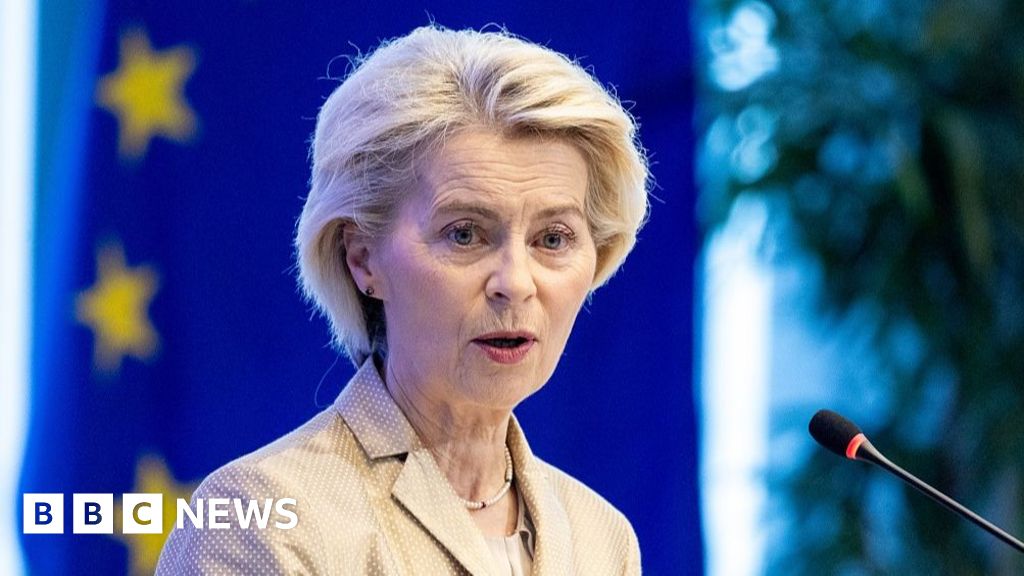
EU Commission proposes curbs on trade with Israel over Gaza war

EU Commission Proposes Trade Restrictions on Israel Amid Gaza Conflict
In a significant diplomatic move, the European Commission has introduced plans to impose restrictions on trade with Israel in response to the ongoing conflict in Gaza. This proposal, which is being characterized as the EU’s most stringent reaction to the war, aims to suspend certain trade provisions outlined in the EU–Israel Association Agreement. The announcement was made by Commission President Ursula von der Leyen last week, and it has sparked considerable debate and controversy.
Proposed Trade Measures
The proposed measures would eliminate the preferential access that Israeli goods currently enjoy in European markets. This would result in the imposition of tariffs on billions of euros worth of exports, particularly affecting agricultural products such as dates and citrus fruits. The EU is Israel’s largest trading partner, accounting for 32% of its total trade in goods, which is valued at approximately €42.6 billion (£35.8 billion) in 2024.
Despite the strong rhetoric surrounding the proposal, experts suggest that the economic impact of these trade restrictions may be limited. EU Trade Commissioner Maroš Šefčovič estimated that the potential effect on the Israeli economy would amount to around €227 million annually. This figure raises questions about the overall effectiveness of the proposed sanctions.
Sanctions on Israeli Officials
In addition to trade restrictions, the Commission’s plans include sanctions targeting specific individuals within the Israeli government, described as “extremist ministers.” The package also aims to address actions by “Hamas terrorists” and “violent settlers” in the West Bank, as articulated by EU foreign policy chief Kaja Kallas. Kallas acknowledged the complexities of garnering support for these measures within the European Council, noting that “political lines are very much in the place where they have been so far.”
Challenges to Approval
The implementation of these proposed measures faces significant hurdles. Trade restrictions require the approval of a qualified majority of EU member states, while sanctions on individuals necessitate unanimous consent. Key member states, including Germany and Italy, have expressed reservations about the proposals, while countries like Ireland and Spain are advocating for even more stringent actions against Israel. This division among member states raises doubts about whether the proposals will be adopted.
Symbolic Suspension of Support
One immediate action included in the proposal is the suspension of bilateral support to the Israeli government. However, this measure is largely symbolic, as it involves a relatively small amount of funding—€9.4 million out of a total allocation of €14 million for the 2020–2024 period. Importantly, this suspension does not require approval from other member states. Mediterranean Commissioner Dubravka Šuica emphasized that funding for programs aimed at combating antisemitism and supporting civil society in Israel would remain unaffected by this decision.
Israeli Government’s Response
The Israeli government has responded critically to the European Commission’s proposals. Foreign Minister Gideon Saar labeled the measures as “morally and politically distorted,” asserting that actions taken against Israel would ultimately harm Europe’s own interests. Saar also indicated that any punitive steps taken by the EU would be met with reciprocal actions from Israel.
Timeline for Implementation
As of now, it remains unclear when the proposed measures will be brought to a vote among EU member states. The internal divisions and varying perspectives on how to address the situation in Gaza complicate the timeline for any potential implementation.
Broader Context of the Conflict
The backdrop to these proposed measures is the ongoing conflict between Israel and Hamas, which has escalated significantly in recent months. The situation in Gaza has drawn international condemnation and calls for accountability from various organizations, including a recent statement from a UN commission of inquiry characterizing Israel’s actions in Gaza as genocidal. The conflict has raised questions about the international community’s role and responsibilities in addressing human rights violations and ensuring peace in the region.
Conclusion
The European Commission’s proposal to restrict trade with Israel highlights the complex interplay between politics, economics, and humanitarian concerns in the context of the Gaza conflict. As the situation continues to evolve, the EU’s response will be closely watched both within Europe and internationally.
Key Facts
– The European Commission has proposed trade restrictions on Israel in response to the Gaza conflict.
– The measures would suspend trade provisions of the EU–Israel Association Agreement, impacting billions of euros in exports.
– Economic impact estimates suggest a potential loss of €227 million annually for Israel.
– Sanctions targeting “extremist ministers” in the Israeli government are also part of the proposal.
– Approval of the measures faces challenges due to differing views among EU member states.
– The Israeli government has criticized the proposals, warning of potential repercussions for Europe.
– The timeline for voting on these measures remains uncertain.
Source: www.bbc.com
